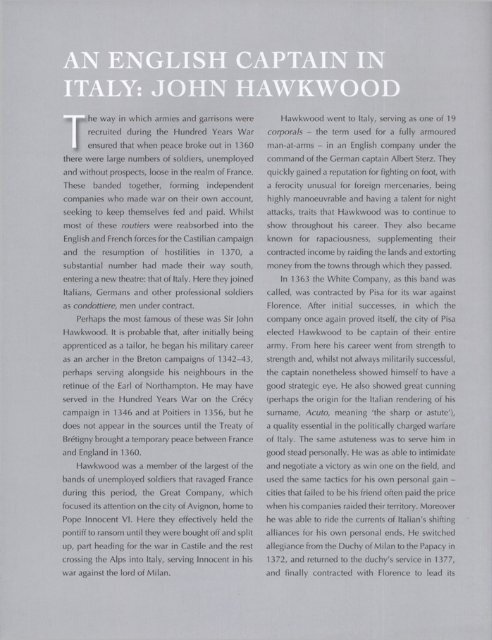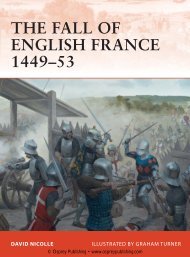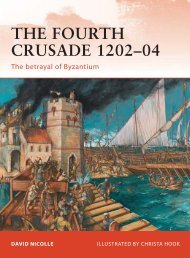Osprey - General Military - Knight - The Warrior and ... - Brego-weard
Osprey - General Military - Knight - The Warrior and ... - Brego-weard
Osprey - General Military - Knight - The Warrior and ... - Brego-weard
Create successful ePaper yourself
Turn your PDF publications into a flip-book with our unique Google optimized e-Paper software.
he way in which armies <strong>and</strong> garrisons were<br />
recruited during the Hundred Years War<br />
ensured that when peace broke out in 1360<br />
there were large numbers of soldiers, unemployed<br />
<strong>and</strong> without prospects, loose in the realm of France.<br />
<strong>The</strong>se b<strong>and</strong>ed together, forming independent<br />
companies who made war on their own account,<br />
seeking to keep themselves fed <strong>and</strong> paid. Whilst<br />
most of these routiers were reabsorbed into the<br />
English <strong>and</strong> French forces for the Castilian campaign<br />
<strong>and</strong> the resumption of hostilities in 1370, a<br />
substantial number had made their way south,<br />
entering a new theatre: that of Italy. Here they joined<br />
Italians, Germans <strong>and</strong> other professional soldiers<br />
as condottiere, men under contract.<br />
Perhaps the most famous of these was Sir John<br />
Hawkwood. It is probable that, after initially being<br />
apprenticed as a tailor, he began his military career<br />
as an archer in the Breton campaigns of 1342-43,<br />
perhaps serving alongside his neighbours in the<br />
retinue of the Earl of Northampton. He may have<br />
served in the Hundred Years War on the Crecy<br />
campaign in 1346 <strong>and</strong> at Poitiers in 1356, but he<br />
does not appear in the sources until the Treaty of<br />
Bretigny brought a temporary peace between France<br />
<strong>and</strong> Engl<strong>and</strong> in 1360.<br />
Hawkwood was a member of the largest of the<br />
b<strong>and</strong>s of unemployed soldiers that ravaged France<br />
during this period, the Great Company, which<br />
focused its attention on the city of Avignon, home to<br />
Pope Innocent VI. Here they effectively held the<br />
pontiff to ransom until they were bought off <strong>and</strong> split<br />
up, part heading for the war in Castile <strong>and</strong> the rest<br />
crossing the Alps into Italy, serving Innocent in his<br />
war against the lord of Milan.<br />
Hawkwood went to Italy, serving as one of 19<br />
corporals - the term used for a fully armoured<br />
man-at-arms - in an English company under the<br />
comm<strong>and</strong> of the German captain Albert Sterz. <strong>The</strong>y<br />
quickly gained a reputation for fighting on foot, with<br />
a ferocity unusual for foreign mercenaries, being<br />
highly manoeuvrable <strong>and</strong> having a talent for night<br />
attacks, traits that Hawkwood was to continue to<br />
show throughout his career. <strong>The</strong>y also became<br />
known for rapaciousness, supplementing their<br />
contracted income by raiding the l<strong>and</strong>s <strong>and</strong> extorting<br />
money from the towns through which they passed.<br />
In 1363 the White Company, as this b<strong>and</strong> was<br />
called, was contracted by Pisa for its war against<br />
Florence. After initial successes, in which the<br />
company once again proved itself, the city of Pisa<br />
elected Hawkwood to be captain of their entire<br />
army. From here his career went from strength to<br />
strength <strong>and</strong>, whilst not always militarily successful,<br />
the captain nonetheless showed himself to have a<br />
good strategic eye. He also showed great cunning<br />
(perhaps the origin for the Italian rendering of his<br />
surname, Acuto, meaning 'the sharp or astute'),<br />
a quality essential in the politically charged warfare<br />
of Italy. <strong>The</strong> same astuteness was to serve him in<br />
good stead personally. He was as able to intimidate<br />
<strong>and</strong> negotiate a victory as win one on the field, <strong>and</strong><br />
used the same tactics for his own personal gain -<br />
cities that failed to be his friend often paid the price<br />
when his companies raided their territory. Moreover<br />
he was able to ride the currents of Italian's shifting<br />
alliances for his own personal ends. He switched<br />
allegiance from the Duchy of Milan to the Papacy in<br />
1372, <strong>and</strong> returned to the duchy's service in 1377,<br />
<strong>and</strong> finally contracted with Florence to lead its







